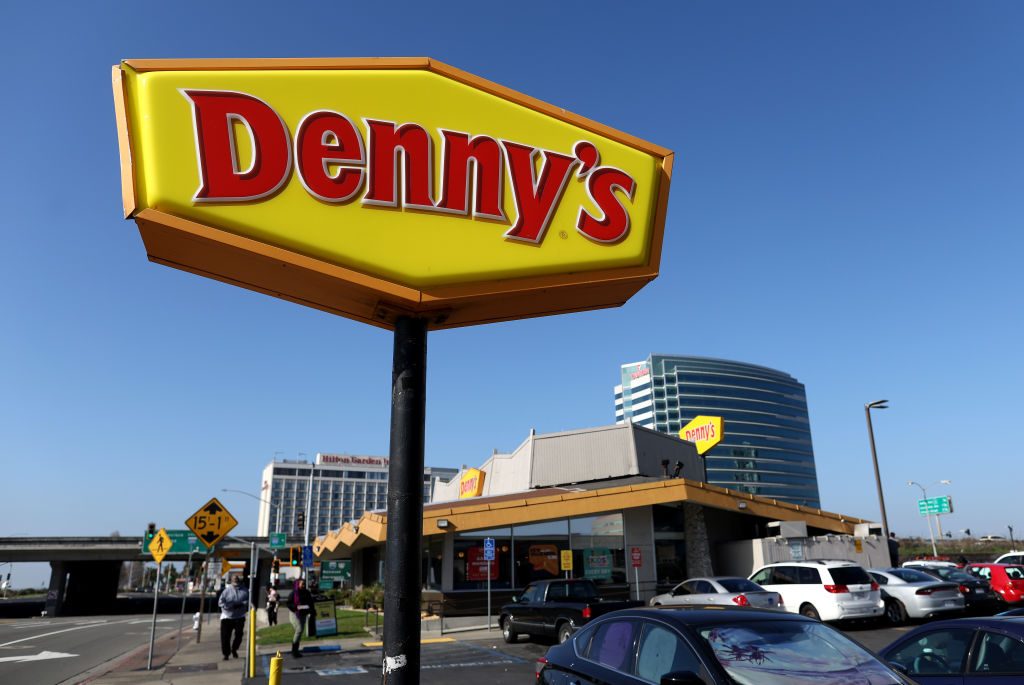
Source: Justin Sullivan / Getty
The recent and clear instance of racial discrimination displayed at a Denny’s location in South Dakota has drawn attention to the embattled restaurant chain’s troubling and decades-long legacy of profiling both customers and employees who are not white.
In case you missed it, in August, two Black truckers recorded their interaction with a waitress at a restaurant in Sioux Falls, where they were repeatedly refused service and criminalized by having the police called on them by management over false claims of intimidation about customers who said they simply wanted to eat and pay for their meals.
When contacted by NewsOne, Denny’s never offered an apology for the behavior of a waitress who was ultimately fired for her role in denying the Black men service. Instead, at the time Denny’s only said that it was investigating the claims that were proven by the video evidence.
“Denny’s has a zero-tolerance policy when it comes to discrimination at all Denny’s locations,” a statement sent to NewsOne said in part. “We embrace diversity and foster an inclusive environment where every guest feels welcome.”
The response from Denny’s hasn’t been satisfactory, according to the civil rights attorney representing the two men, who last month vowed to sue the restaurant chain.
“This is something that’s bound to repeat itself,” attorney Harry Daniels said. “Historically, Denny’s has repeated itself over and over again,” Daniels said during a press conference.
Daniels wasn’t lying, as a closer look at Denny’s over the last 30 years reveals an apparent pattern at the company that has more than 1,500 locations across the U.S. That number includes at least seven of them that are guilty of holding Black and brown customers to different — and illegal — standards than their white counterparts.
Keep reading to find a comprehensive timeline of Denny’s unfortunate legacy of racial discrimination and profiling over the course of more than 30 years.

Source: Justin Sullivan / Getty
1992
In California, a Black customer and his Black friends at a Denny’s in Sacramento claimed they were prompted to pay for his food before being served.
Douglas McNeal was wearing a suit and tie following a fraternity party when he and his friends entered the restaurant. He said “he was humiliated when he realized Denny’s had a double standard for black and white customers,” Black Enterprise reported before adding: “a waitress told him black customers had come in before him and refused to pay, so the manager was now insisting that all black patrons pay in advance.”
That instance would seemingly open the floodgate for such valid racial discrimination, harassment and profiling claims against Denny’s in both the immediate term as well as the decades to come.
1993
Perhaps most notoriously, that same year six Black Secret Service agents filed a federal discrimination suit claiming a Denny’s in Annapolis, Maryland, refused to serve them.
Later that year, Denny’s and the NAACP signed a Fair Share Agreement to provide minorities with greater employment and business opportunities throughout the company.
The incident in Annapolis became so notoriously well-known in popular culture that the renowned jazz musician Branford Marsalis (under the stage name Buckshot LeFonque) released a hip-hop-fused song called “Breakfast at Denny’s” the following year.
1994
Denny’s forked over $54 million “to settle lawsuits filed by thousands of black customers who had been refused service or had been forced to wait longer or pay more than white customers,” as the New York Times reported.
That same year, a 23-year-old Black woman named Tashanda Moreno sued a Denny’s location in Manteca, California, alleging racial discrimination, according to the Stockton Record.
1995
A racial discrimination lawsuit was filed against the same Denny’s in Manteca, California, for Katina Beltran, a 21-year-old Black woman who said she was fired after only a few months on the job. Beltran’s lawsuit described a workplace environment that held her to a different standard than her white counterparts. She claimed she was even subjected to racial tropes like her superiors “assuming incorrectly that she once had been on welfare and directing her to call company tax preparers so Dennys could receive tax credits for hiring a former welfare recipient,” the Stockton Record reported at the time.
Separately, a lawsuit sparked by the case in Sacramento where Black customers claim they were forced to pay prior to service was settled in 1995, according to an archived article by the Sacramento Bee.
1997
In 1997, it was revealed that the scourge of racism that was apparently so prevalent at Denny’s locations was not restricted to Black people.
That was when a group of six Asian or Asian American students at Syracuse University in upstate New York claimed they were not only refused service but also forcibly removed by security guards following their complaints about not being waited on for the more than 30 minutes they were in the restaurant as white customers were being served. Once outside the restaurant, a group of white men brutally assaulted them, the lawsuit claimed.
At least two of the students were left unconscious.
“Recognizing that the security guards hadn’t tried to intervene, two black students -Antwauene Ponds and Marchelle Woelfel – left the waiting area to break up the fight,” the Daily Orange, Syracuse University’s student-run newspaper, noted 10 years later. “When they returned inside the restaurant, they began to complain to employees about the security guards. After a warning, they, too, were asked to leave.”
1998
Following an investigation, a federal civil rights monitor determined that the Denny’s employees in Syracuse discriminated against the Asian students and ordered the manager who removed the student to be fired. Denny’ was also forbidden from rehiring the security guard. Additionally, “the hostess who initially ignored the group” should be suspended and docked pay, the civil rights monitor ruled, according to a report from the Daily Orange.
2016
Eyewitness testimony from a white customer at a Denny’s in Los Angeles corroborated the basis of a racial discrimination lawsuit against the restaurant chain that Black customers were told to pay before they were served. Video evidence also backed up the claims.
NBC Los Angeles reported at the time that the restaurant’s manager was “concerned after learning from the couple’s server about the size of their order, which totaled more than $83, because the Koreatown location had prior problems with people leaving without paying.”
2017
In 2017, a Black patron at a Denny’s in Washington state claimed a waitress and manager demanded he and his fellow Black male diners pay for their food prior to eating. Palmer L. Pellham said the men were the only ones in the restaurant asked to pay for their food beforehand. He also claimed that they were forced to wait 10 minutes before being seated, even though there were plenty of available tables.
2018
In 2018, 25 Black churchgoers said they were refused service at a Denny’s in Lake City, Florida. Elijah Henderson Jr. said he was told his party couldn’t be served because the restaurant was understaffed. However, soon after another large group was seated.
2023
There are undoubtedly other instances, such as the time a “waitress’s demeanor altered drastically” when a white patron she had been faithfully serving was joined by his Black wife.
“She slammed down a plate of spaghetti in front of the black woman, splattering her blouse with tomato sauce,” according to a report entitled “Denny’s & Racism” published by the University of Wisconsin School of Business.
While it’s unclear when and where that incident happened, what is abundantly clear is that Denny’s has not only earned its reputation for racism but also that it has sustained that reputation by repeating the same mistakes that critics might think aren’t actually mistakes at all.
This is America.
SEE ALSO:
White People Say They’re Being Discriminated Against ‘A Lot More’ Than Black Americans, Poll Finds
The post Denny’s And Its Decades-Long Legacy Of Racial Profiling And Discrimination appeared first on NewsOne.
Denny’s And Its Decades-Long Legacy Of Racial Profiling And Discrimination was originally published on newsone.com
















